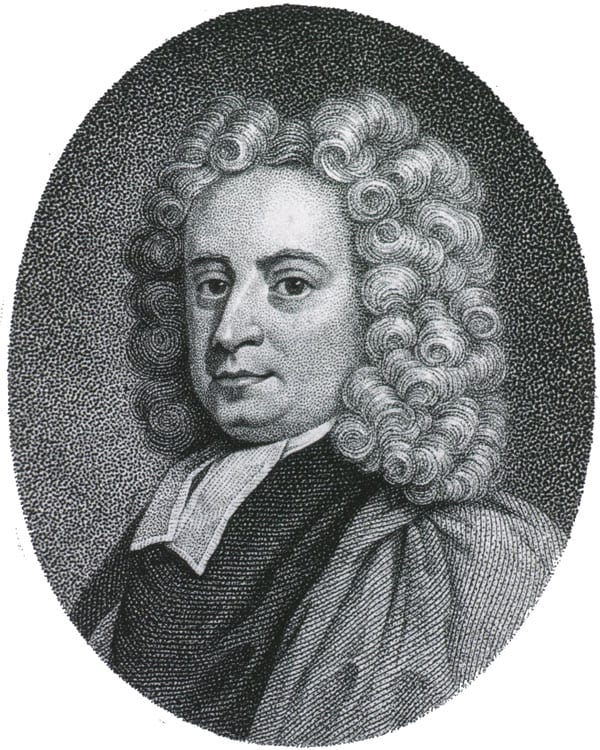There are may ways of engaging with the sky, and when we are in the mood for sweeping generalisations it can feel as if there is a ‘male’ approach to the sky, involving nerdy cloud classifications, weather forecasting, and the like, as well as a ‘female’ one, focussing on the emotional quality of clouds and how they stimulate our imaginations. These stereotypes came to mind when we came across this 1733 poem by Dr Thomas Sheridan (1687-1738). Searching for some way to encapsulate womankind, Sheridan hit upon the idea that you can compare a lady to a cloud. He wrote this poem on the subject to his good friend, the famous 18th-Century satirist Jonathan Swift. Swift subsequently replied with a poem arguing that clouds are nothing like ladies, which is far too bawdy to repeat here.
A New Simile for The Ladies
by Dr Thomas Sheridan
I often tried in vain to find
A simile for womankind,
A simile, I mean, to fit ’em,
In every circumstance to hit ’em.
Through every beast and bird I went,
I ransack’d every element;
And, after peeping through all nature,
To find so whimsical a creature,
A cloud presented to my view,
And straight this parallel I drew:Clouds turn with every wind about,
They keep us in suspense and doubt,
Yet, oft perverse, like womankind,
Are seen to scud against the wind:
And are not women just the same?
For who can tell at what they aim?Clouds keep the stoutest mortals under,
When, bellowing, they discharge their thunder:
So, when the alarum-bell is rung,
Of Xanti’s everlasting tongue,
The husband dreads its loudness more
Than lightning’s flash, or thunder’s roar.Clouds weep, as they do, without pain;
And what are tears but women’s rain?The clouds about the welkin roam:
And ladies never stay at home.
The clouds build castles in the air,
A thing peculiar to the fair:
For all the schemes of their forecasting,
Are not more solid nor more lasting.A cloud is light by turns, and dark,
Such is a lady with her spark;
Now with a sudden pouting gloom
She seems to darken all the room;
Again she’s pleased, his fear’s beguiled,
And all is clear when she has smiled.
In this they’re wondrously alike,
(I hope the simile will strike,)
Though in the darkest dumps you view them,
Stay but a moment, you’ll see through them.The clouds are apt to make reflection,
And frequently produce infection;
So Celia, with small provocation,
Blasts every neighbour’s reputation.The clouds delight in gaudy show,
(For they, like ladies, have their bow;)
The gravest matron will confess,
That she herself is fond of dress.Observe the clouds in pomp array’d,
What various colours are display’d;
The pink, the rose, the violet’s dye,
In that great drawing-room the sky;
How do these differ from our Graces,
In garden-silks, brocades, and laces?
Are they not such another sight,
When met upon a birth-day night?The clouds delight to change their fashion:
(Dear ladies, be not in a passion!)
Nor let this whim to you seem strange,
Who every hour delight in change.In them and you alike are seen
The sullen symptoms of the spleen;
The moment that your vapours rise,
We see them dropping from your eyes.In evening fair you may behold
The clouds are fringed with borrow’d gold;
And this is many a lady’s case,
Who flaunts about in borrow’d lace.Grave matrons are like clouds of snow,
Their words fall thick, and soft, and slow;
While brisk coquettes, like rattling hail,
Our ears on every side assail.Clouds, when they intercept our sight,
Deprive us of celestial light:
So when my Chloe I pursue,
No heaven besides I have in view.Thus, on comparison, you see,
In every instance they agree;
So like, so very much the same,
That one may go by t’other’s name.
Let me proclaim it then aloud,
That every woman is a cloud.





